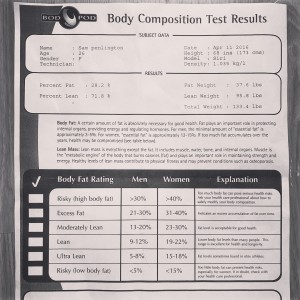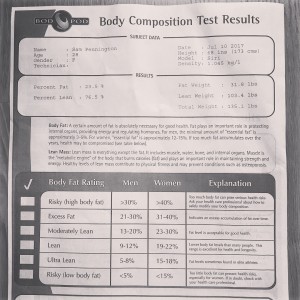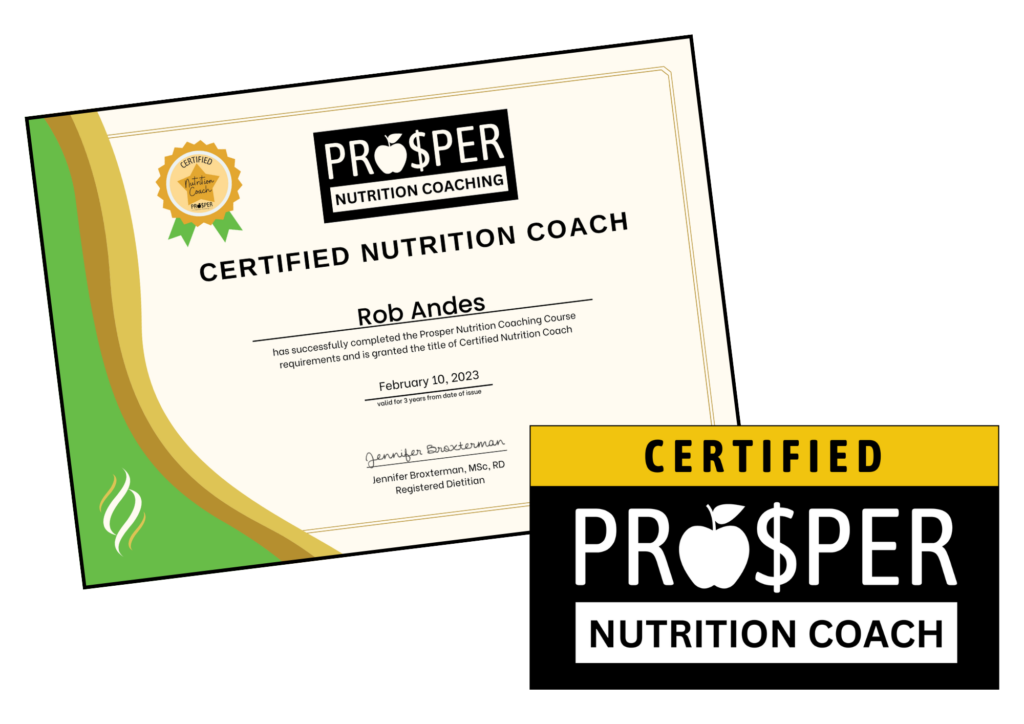

Assessing Body Composition: When the Scale Lies

Over the past 15 months, I’ve eaten mostly healthy, whole foods and exercised very consistently. And guess what? I GAINED WEIGHT.
Now, that hardly seems fair if you just look at the number on the scale, but when you look a little deeper it’s not that simple.
Okay, let’s rewind back 15 months. For years, I ate fairly well and exercised moderately. Before completing my first BodPod body composition testing, I thought I was in pretty good shape, considering my BMI was always on the low end of healthy. So, I was totally shocked when last April my body composition testing showed that I was 28% body fat (getting pretty close to the cutoff of under 30% for good health!).

My test results from April 2016
The test is completed by Dr. Peter Lemon, a prestigious professor at Western University in the School of Kinesiology. After getting the results, I asked him for his advice: what is the best way to help reduce body fat levels and get lean to promote a healthy body? The single piece of advice he gave me was to focus my efforts on getting my lean weight up through strength training while maintaining my healthy eating habits, because body fat would have to start dropping in response.
I followed his advice and fast forward 15 months I weigh MORE and my BMI is HIGHER.

My test results from July 2017
However, when looking at my body composition results you’ll see that things have changed for the better, despite not losing any weight. Over the 15 months, I gained about 7.5lbs of muscle and lost about 6lbs of fat. This lead to decreasing my body fat percentage from 28% to 23.5%! Considering I had to scale back on exercise for half a year and take two months off due to some serious health issues and surgery, I really didn’t expect to see big changes. This is a really good example of how many positive changes can be going on internally, but you can’t see that progress on the scale (or the mirror!). Because fat loss and muscle gain happen so slowly, I also really didn’t notice a change in the way my clothing fit, or notice a change in the way my body looked.
To book your own body composition testing and obtain your own lean-to-fat mass ratio, click here.
Now, weight loss and being super lean isn’t the most important thing in the world. What is important is having a strong, healthy body that helps you live the life that you want. I’m really not stuck on having a specific body fat percentage for aesthetic purposes. My focus is on minimising my body fat percentage for health and longevity purposes. If I’ve learned anything in the last few months, it is that I’ll never take my health and well-being for granted again. Having my health is the MOST important thing to me.
Read more about my journey and how to balance a healthy lifestyle with health issues here.
There’s this misconception that to see progress with weight loss that you need to be PERFECT. Low calorie, no carbs, no alcohol, and at the gym ALL the time to see weight loss results. This couldn’t be further from the truth. The best diet is one that is sustainable for you. One that you can follow consistently without feeling deprived and that accommodates your lifestyle and resources (time, financial, etc.). You can enjoy your life and make meaningful progress with your health, weight, and relationship with food.
For example, during these past 15 months I:
- Went to the gym 3-5 days a week, depending on my schedule and how I was feeling
- Didn’t run myself into the ground by pushing my physical limits at every single workout
- Gave myself permission to take days off to recover without guilt
- Did exercise and movement that I LOVE, that was enjoyable and didn’t feel like a punishment
- Ate healthy, whole foods about 75% of the time
- Allowed myself permission to eat out about 2x per week when I was too exhausted to cook
- Enjoyed brunch or dinner out with friends at least once per week
- Had a glass of red wine at many of those dinners out
- Ate cake for dinner on at least 2 separate occasions 🙂
- Regularly drank my much-loved Starbucks Grande Soy Chai Tea Latte
- Had a small portion of junk food 1-2 times a week when I was craving something sweet
- Went through a period of 5 months where I was really sick and could only stomach quick digesting carbs like toast, crackers, noodle soup, etc.
You see, I certainly wasn’t perfect with my eating habits (I probably never will be) and I actually enjoyed the process (minus the health issues and surgery part). The key to success is being as consistent as possible with healthy habits, and allowing yourself some slack on the days where you need rest or social time out where the healthy options are limited. If I can share one tidbit of nutrition wisdom here, it would be to give you a real-life example of someone who is doing all (well mostly – this girl loves her cupcakes 😈) the right things and not losing weight. It’s practically impossible to tell what’s going on only based on the number on the scale. Your body can be getting stronger, and healthier every day and you may not be able to notice or tell.
When you start eating unprocessed, whole foods and exercising regularly, your weight is bound to fluctuate ALL over the place. You can hold extra weight in your gut from the extra fibre, start holding more carb and water in your body/muscles (if you were dehydrated or eating low carb before), or just be gaining muscle and going through body re-composition.
Don’t panic if you start gaining weight. Here are my top three suggestions to help you assess if you are making meaningful progress:
1) Reflect every several weeks on how your clothes are fitting, they should slowly start fitting better over the course of time.
2) Take body measurements every 4 weeks of your bust, waist, hips, and one arm and leg (make sure you measure the same side every time!). Fat is more ‘fluffy’ than muscle and takes up about 15% more space than muscle, so if you are gaining muscle and losing fat you’ll likely see very little changes in your weight. Be patient, it takes time for your body to gain muscle and lose fat. Meaningful changes usually take about 4 weeks.
3) Check-in with a nutrition professional to make sure you are on track with your nutrition. Changing your habits can be HARD, and sometimes having an expert around to act as a guide to help you change your nutrition is exactly what you need to start seeing progress. Also, there are SO many opinions on the internet on the best diet for weight loss. Low carb? Eliminate grains? Low fat? Paleo? Sometimes you just need some support in creating the best diet for you; one that is sustainable and is actually delicious and doesn’t taste like cardboard.
——————————————————————————————————————
At NutritionRx, we specialise in helping you achieve long-term, sustainable weight loss. No hunger, no deprivation, just strategies that help you healthily lose weight (focusing on fat loss) and keep it off. If you are ready to transform your life, mindset, and relationship with food, we would love to help! Shoot us an email at info@nutritionrx.ca to easily set up your first appointment.
Wishing you health & happiness,
♡ Jen
Jennifer Broxterman, MSc, RD
Registered Dietitian
NutritionRx: happy, healthy living with our team of Registered Dietitians
Prosper Nutrition Coaching: a world-class nutrition coaching certification
+
+
+
Want to work with a NutritionRx Registered Dietitian?
Learn more here: Nutrition Packages & Rates
+
+
+
Want to become a Certified Nutrition Coach?
Learn more about our habits-based Prosper Nutrition Certification



